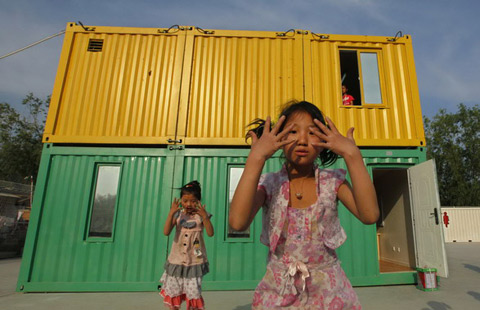Weak buildings threaten life
Updated: 2014-04-11 07:31
By Zheng Fengtian (China Daily)
|
|||||||||||
In fact, Zhu Minfeng, the Guangdong provincial bureau of quality supervision, even warned people not to buy apartments in buildings built in 2007 or 2008 in Guangdong because developers had grossly compromised on the quality of materials and construction.
The average lifespan of buildings in China is less than those in Japan or European countries. Buildings in Japan have a longer lifespan even though the country is often rocked by massive earthquakes. Europe is home to many "centurion" buildings, the average lifespan of buildings in the United Kingdom is 130 years. On the other hand, the average lifespan of a building in China is about 50 years, much less than that in Switzerland and Norway (80 years).
"The reason some buildings (in China) won't last more than 50 years, or in some cases about 25 years, is their faulty architectural structure and the use of low quality materials," Zhou says. So, people "should pay attention to not only the buildings that have collapsed, but also to the potential risks that other buildings hide".
Since rebars and concrete make up the "skeleton" of a building and support its weight, they should be of sound quality. And rebars need quality concrete cover to prevent corrosion. If substandard materials are used for the concrete cover, corrosion will set in earlier than expected and shorten the life of the building.
The quality issue is closely related to the rapid development of the construction industry and weak supervision. A real estate project is usually divided into three phases: design, construction and inspection for approval. Experts say quality is compromised most during the construction process. The problems, however, could be detected during the last process, that is inspection. But corruption and nepotism play a vital role in ensuring that the potential risks go either "undetected" or "unreported".
Perhaps developers are right - people should not be worried about extending their property rights beyond 70 years because many of the buildings are likely to be pulled down before their property rights expire.
The use of inferior materials in building construction is not only a safety risk for residents, but also could lead to legal tangles. With China experiencing a realty boom, it will be difficult for a homeowner (or his/her successor) to trace the original developer or construction company, that is, if it is still around after a few decades. In such cases, the family has to bear the loss if a building collapses.
Besides, many families have to mortgage their homes to meet the skyrocketing housing prices. So the collapse of a building before a homebuyer pays off his/her loan will create a peculiar situation for both the homebuyer and the bank. Why should a homebuyer pay his/her mortgage after losing his/her house? But then, why should the bank not get back its loan if a building collapses? That's why a compensation system needs to put in place to deal with such cases and minimize the loss of houseowners.
The author is deputy dean of the agricultural economics and rural development school at the Renmin University of China.
Related Stories
Official commits suicide following building collapse 2014-04-10 13:40
Building systems to prolong structures’ lives 2014-04-09 08:38
Building that collapsed reported unsafe in December 2014-04-05 07:55
Building collapse kills one in E. China 2014-04-04 11:11
Today's Top News
Putin instructs lenient gas policy with Ukraine
World leaders join Weibo
Campaign to save Moscow tower
21 injured in US school knife attack
China to spend more on railways
G20 to focus on boosting economy, not Crimea
RMB to be global reserve currency
US slashes Iran's pick for UN envoy
Hot Topics
Lunar probe , China growth forecasts, Emission rules get tougher, China seen through 'colored lens', International board,
Editor's Picks

|

|

|

|

|

|





